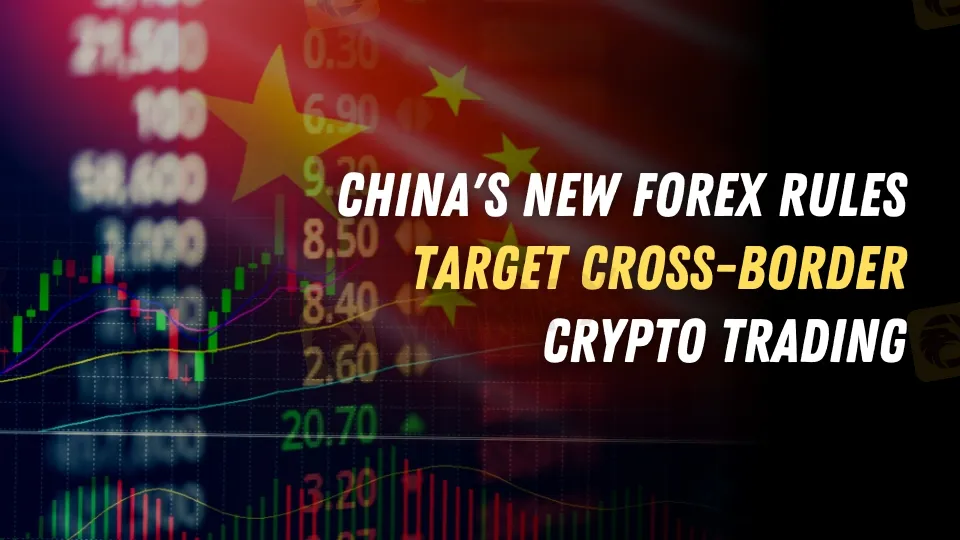China's New Forex Rules Target Cross-Border Crypto Trading
Abstract:China's new forex rules tighten monitoring of cross-border crypto trades, requiring banks to track identities, fund sources, and trading frequencies.

China's new foreign exchange (FX) rules strengthen curbs on cross-border cryptocurrency trading in order to combat unlawful financial activity. These laws are yet another step in the country's continued efforts to impose its anti-crypto policy.
The Chinese foreign exchange regulator now compels banks to monitor and warn of potentially dangerous currency transactions, including those using cryptocurrencies. This includes cross-border gambling, underground banking, and other illegal financial transactions. Banks must now track the identities of individuals and institutions, as well as their funding sources and trade frequency.
According to a December 31 story by the South China Morning Post, new laws will make it more difficult for residents to own digital assets. According to Liu Zhengyao, a lawyer at ZhiHeng law firm, the regulations strengthen the legal basis for punishing crypto-related actions. He also pointed out that utilizing the yuan to buy cryptocurrency before converting it to foreign fiat currencies is now considered cross-border activity, making it practically difficult to avoid the limitations.
China has banned cryptocurrency trades since 2019. The government's main objectives were to reduce energy usage from cryptocurrency mining and to control greenhouse gas emissions. Financial institutions are also barred from conducting transactions involving digital assets or crypto-mining operations.
Despite its stringent policies, China remains the world's second-largest Bitcoin holder. According to Bitbo's Bitcoin Treasuries tracker, the government has roughly 194,000 BTC worth $18 billion. These holdings were acquired through asset seizures tied to illegal operations, as China's ban prohibits it from actively purchasing Bitcoin.

Number of countries holding Bitcoin. Source: BitcoinTreasuries.NET by Bitbo
Former Binance CEO Changpeng “CZ” Zhao claimed that China may someday adopt a Bitcoin reserve policy. Zhao stated at the Bitcoin MENA event in Abu Dhabi that if China chose to embrace Bitcoin, it may quickly adopt policies.
Final Thoughts:
China's new FX regulations highlight its commitment to regulating cross-border financial operations and curbing the usage of digital assets. These policies reflect the government's overarching purpose of ensuring financial stability and control. As the global cryptocurrency market evolves, the impact of China's policies on international markets and the future of cryptocurrencies will be crucial to monitor.

Read more

YouTube Creators Sue PayPal Over Honey’s Affiliate Tool
YouTube creators sue PayPal over the Honey browser tool, alleging redirected affiliate commissions. The case highlights affiliate fraud and its impacts on the creator economy.

OPEC's Profound Influence on the Oil Market
At present, oil prices remain relatively stable, but global economic recovery and shifting market demands continue to drive price fluctuations. Amid an uncertain global economic and geopolitical landscape, OPEC’s policies and actions remain key determinants of oil prices.

What Are The Top 5 Cryptocurrency Predictions For 2025?
Discover the top 5 cryptocurrency predictions for 2025, including Ethereum's rise, a potential bear market, meme coin struggles, and regulatory shifts.

Think Before You Click: Malaysian Loses RM240,000 to Investment Scam
A manager from Sibu, Malaysia, lost RM240,000 to a fraudulent investment scheme.
WikiFX Broker
Latest News
Will Gold Break $2,625 Amid Fed Caution and Geopolitical Risks?
ECB Targets 2% Inflation as Medium-Term Goal
New Year, New Surge: Will Oil Prices Keep Rising?
PH SEC Issues Crypto Guidelines for Crypto-Asset Service Providers
FTX Chapter 11 Restructuring Plan Activated: $16 Billion to Be Distributed
Think Before You Click: Malaysian Loses RM240,000 to Investment Scam
Bithumb CEO Jailed and Fined Over Bribery Scheme in Token Listing Process
WikiFX Review: Something You Need to Know About Saxo
Is PGM Broker Reliable? Full Review
Terraform Labs Co-founder Do Kwon Extradited to the U.S. to Face Fraud Charges
Rate Calc
